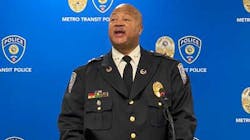Met Council releases safety, security initiatives for Metro Transit
The Metropolitan Council and Metro Transit announced safety and security initiatives that aim to improve the customer experience on and around buses and trains.
The initiatives amount to more than $4 million in annual investment and are the next steps in an evolution of investments started two years ago.
They include:
- Increasing and redeploying community service officers;
- Adding dedicated staffing in the Real Time Information Center; and
- Recruiting additional full-time Metro Transit Police Officers.
“To build our team, we are embarking on a significant recruitment and hiring effort that will help our department proactively address safety concerns and create the kind of environment riders and frontline staff deserve,” Metro Transit Police Chief Eddie Frizell wrote in a post on Metro Transit’s website. “All of us at Metro Transit and the Metropolitan Council recognize how important this mission has always been, and the critical role it plays in our effort to emerge from the pandemic as a stronger, better service provider.”
Frizell notes that Metro Transit’s recruitment and hiring efforts are aimed at:
- Building a team of up to 70 part-time community services officers (CSOs) and expanding their duties to include validating fares, educating riders and working alongside police officers as they grow into law enforcement careers.
- Dedicating 11 staff–a team of sworn officers and civilians–to monitoring surveillance cameras in real time so officers can spend more time spotting and guiding responses to problems on light-rail vehicles, light-rail stations and other busy boarding areas.
- Recruiting and hiring an additional 10 police officers so the transit police is better equipped to patrol and respond to serious incidents.
“I am grateful for the investments that are being made in our department, and optimistic that these additional resources will meaningfully improve the experience our customers and frontline staff have while on transit,” Frizell concluded.
